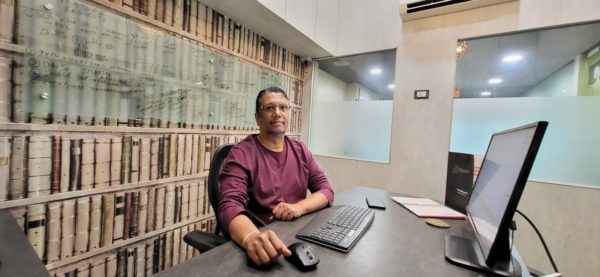B. Swaminathan
The average monthly shipment value of MSMEs is approximately Rs 1.4 million per month. On the lower side, it ranged between Rs 50,000 to Rs 2,00,000 per month and on the higher side it was in the range of Rs 50 Lakhs to Rs 1 Crore.
Over 80% of MSMEs said that the Monthly shipment value is in the range of Rs 50,000 to Rs 10 lakh per month. The average per-order ticket size is in the range of Rs 750 to Rs 1500. On some days, the average ticket size per order can drop below Rs 750 in the range of Rs 180 to Rs 650 and can increase to the range of Rs 2500 to Rs 3500. The daily average ticket size of orders are in the range of Rs 9500 to Rs 15,000. MSMEs experience a rise in daily ticket size of orders in the range of Rs 18,000 – Rs 22,000.
Eugene Panfilov, Managing Director, Borzo India speaks to CMR on the trends in the MSME sector.
Q1.What are the current trends shaping the landscape of MSMEs in India, particularly in light of recent economic and regulatory changes?
Ans. MSMEs serve as the backbone of the economy with a vital contribution to entrepreneurship development at the grassroots level. While the Ministry of Micro, Small and Medium Enterprises has been working on many schemes and programs to support MSMEs covering different areas like financial support and access to capital, building infrastructure, training programs, and marketing assistance, the recent announcements in Interim Budget highlight Government’s priority to set newer trends of establishing more clusters and new technology centres.
MSMEs engaged in the Energy sector, particularly in Incentivising biofuels, rooftop solarization, wind energy, and EVs will receive special focus in terms of a favourable environment for the growth of MSMEs and job creation. In fact, the current adoption of EVs in commercial use, especially last-mile deliveries also shows that more support and subsidies in the sector are enabling more players and partnerships.
Q2.How have MSMEs in India adapted to challenges such as access to finance, skilled labour shortages, and technological advancements in the past year?
Ans. The challenges have not yet been fully countered and are a work in progress. Securing financing for MSMEs in India is tough due to challenges like no credit history, not enough collateral, limited awareness about government schemes, and high interest rates. This makes it hard for them to grow. To attract employees, MSMEs need to offer good pay, chances for career growth, and a positive workplace. Finance and Recruitment remain two of the biggest challenges that MSMEs are facing and working to resolve with added support from the government such as the Industrial Training Institute (ITI) for skilled labour.
MSMEs are adopting technologies such as robust use of CRM from prominent tech players, API integrations from 3rd party service providers such as logistics players and adoption of cloud storage and virtual desktops. MSMEs involved in the manufacturing sector are researching using advanced tech like AI and IoT, whereas data analytics has been rampant across sectors. It’s important to note that MSMEs operating at a specific scale of operations are adopting making it easier to scale up while saving money and being flexible. To highlight these pain points of MSME, Borzo is organizing an MSME conference called Borzo Connect, which will drive the conversation on how MSMEs can access finance, counter-recruitment issues and adopt technology.
Q3.With the emergence of digital platforms and e-commerce, what opportunities and challenges do MSMEs face in terms of market reach, competitiveness, and customer engagement?
Ans. One of the important developments in the last 2 years has been the introduction of ONDC to boost e-commerce in India while ensuring transparency and zero monopoly. ONDC has been introduced to boost the e-commerce industry and influence allied players such as logistics companies in partnering with small-scale retail vendors, ensuring smooth nationwide delivery to customers. The impact of ONDC is still taking centre stage and developing slowly but it remains an important avenue for MSMEs and small retailers to access nationwide urban and rural markets free from the influence of monopolistic practices.
The adoption of technology presents an immense opportunity for MSMEs to grow. For apparel brands and consumer brands, Shopify and Woo-commerce frameworks with API integrations of Delivery partners have made it easy to operate a D2C store. Small businesses might struggle to use online tools or compete with bigger firms and adequate training will help these businesses adopt technology better. As a last-mile delivery partner for various MSMEs, we at Borzo have seen first-hand how Social media reach has changed the game for MSMEs. They can reach out to a wide audience and sell their products by making the best use of platforms like Instagram and Facebook.
Customer acquisition is a challenge that MSMEs are grappling with at all levels. MSMEs that are using the push strategy and ensuring their presence at Trade body exhibitions and industry Events both National and International are staying competent. MSMEs that have been at the forefront of digital adoption and Data analysis are experiencing better lead generation and sales prospects.
Small businesses can use E-commerce platforms to gather and assess comprehensive customer information, including product specifications, pricing, page interactions, purchase history, and specific preferences like delivery preferences and locations. This wealth of data serves as a valuable asset for MSMEs, particularly those without advanced technical capabilities, empowering them to promptly address customer needs and improve post-sales support.
Q4.What role do government policies and initiatives play in supporting the growth and sustainability of MSMEs in India, and what improvements are needed to further enhance their impact?
Ans. In India, government regulations and initiatives play a crucial role in facilitating the growth and resilience of small and medium enterprises (SMEs). These regulations provide various forms of assistance, including financial support, infrastructure development such as improved roadways, and streamlined business processes. Additionally, programs like Start-up India provide funding and other forms of assistance specifically tailored to support emerging businesses. The Make in India campaign further encourages local production and global competitiveness among businesses.
Various schemes by the Ministry of Micro, Small and Medium Enterprises offer initial funding to support the development of innovative business concepts (including new technologies, processes, products, and procedures) that have the potential for commercialization within a year. Through this initiative, financial support is extended to establish business incubators.
A monitoring process to ensure that pain points arising during the execution and outreach of these schemes are monitored and addressed timely. Communication of various schemes across channels should be a priority as MSMEs will be aware of the developments especially small businesses operating in Tier 3 cities and rural areas.
Q5.In what ways are MSMEs leveraging innovation and technology to streamline operations, enhance productivity, and stay resilient in the face of market uncertainties?
Ans. Today, you will see many tech companies offering solutions tailored to the needs of MSMEs, be it Zoho’s affordable product suite for small businesses or even Salesforce suite for medium and large enterprises, right from CRM and Task managers to specialized APIs and Inventory management.
Small and medium-sized businesses are using new technology increasingly to streamline and automate their operations. An internal survey that we conducted at Borzo, highlighted that 85% of MSMEs have their supply chain automated, which shows the growing API solutions offered by delivery companies and the fast adoption rate by businesses. While the usage of digital tools for sales and marketing is common, MSMEs dealing in finished products are deploying robots at various levels to bring efficiency and make business processes faster and with fewer mistakes.
The biggest uncertainty that businesses have faced in recent times was the period 2020 to 2022, the COVID-19 and its after effects. Though lack of business impacted many MSMEs, it’s safe to say many have gotten back on track. Given the right implementation of various schemes, the question remains how far will they grow in favourable circumstances?
Q6.What are the key factors influencing the export potential of Indian MSMEs, and how can these businesses capitalize on global market opportunities while navigating trade barriers and geopolitical tensions?
Ans. Geopolitics and trade barriers cannot be navigated in any scenario by the business community despite being at the receiving end. Given that it’s a reality in today’s world, Indian MSMEs have the potential to thrive in global markets through strategic approaches.
Firstly, selecting the right product mix tailored to diverse global consumer preferences is essential.
Secondly, ensuring superior product quality compared to competitors in countries like China, Taiwan, Vietnam, and Bangladesh is imperative, adhering to international standards.
Thirdly, conducting thorough market research to understand international demand and competitor strategies is crucial.
Fourthly, participating in government programs and exhibitions facilitates product visibility and provides assistance with administrative procedures.
Fifthly, leveraging specialized financial instruments mitigates risks such as payment defaults and currency fluctuations from global customers.
Additionally, forging cross-border business partnerships enables access to wider customer bases and accelerates growth.
Q7.What are your views on MSMEs adopting the technology in India? Given their budget constraint?
Ans. As mentioned earlier, technology firms are customizing their offerings for MSMEs, providing Software as a Service (SaaS) solutions at affordable price points, allowing even small businesses to streamline their operations. Moreover, certain software and delivery firms are providing free APIs, which prove advantageous for small businesses. Interestingly, this isn’t a financial burden for these companies due to their scale.
Large-scale adoption of IOT devices and mainstream business use of AI by MSMEs will happen in due course. Of course, the bigger players have begun the adoption. The Ministry’s focus on the development of a technology centre should speed up the tech adoption in MSMEs in the next few years.













